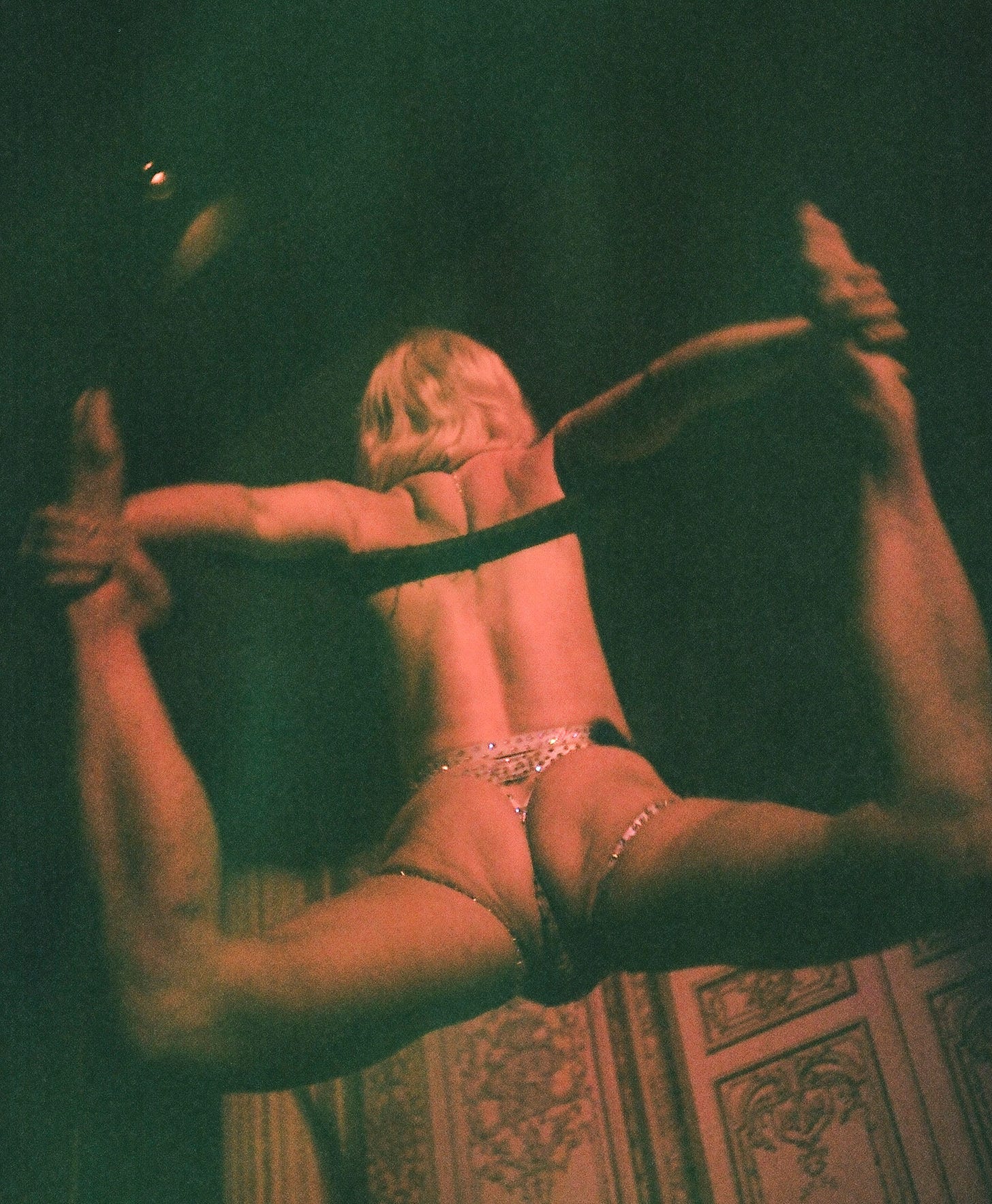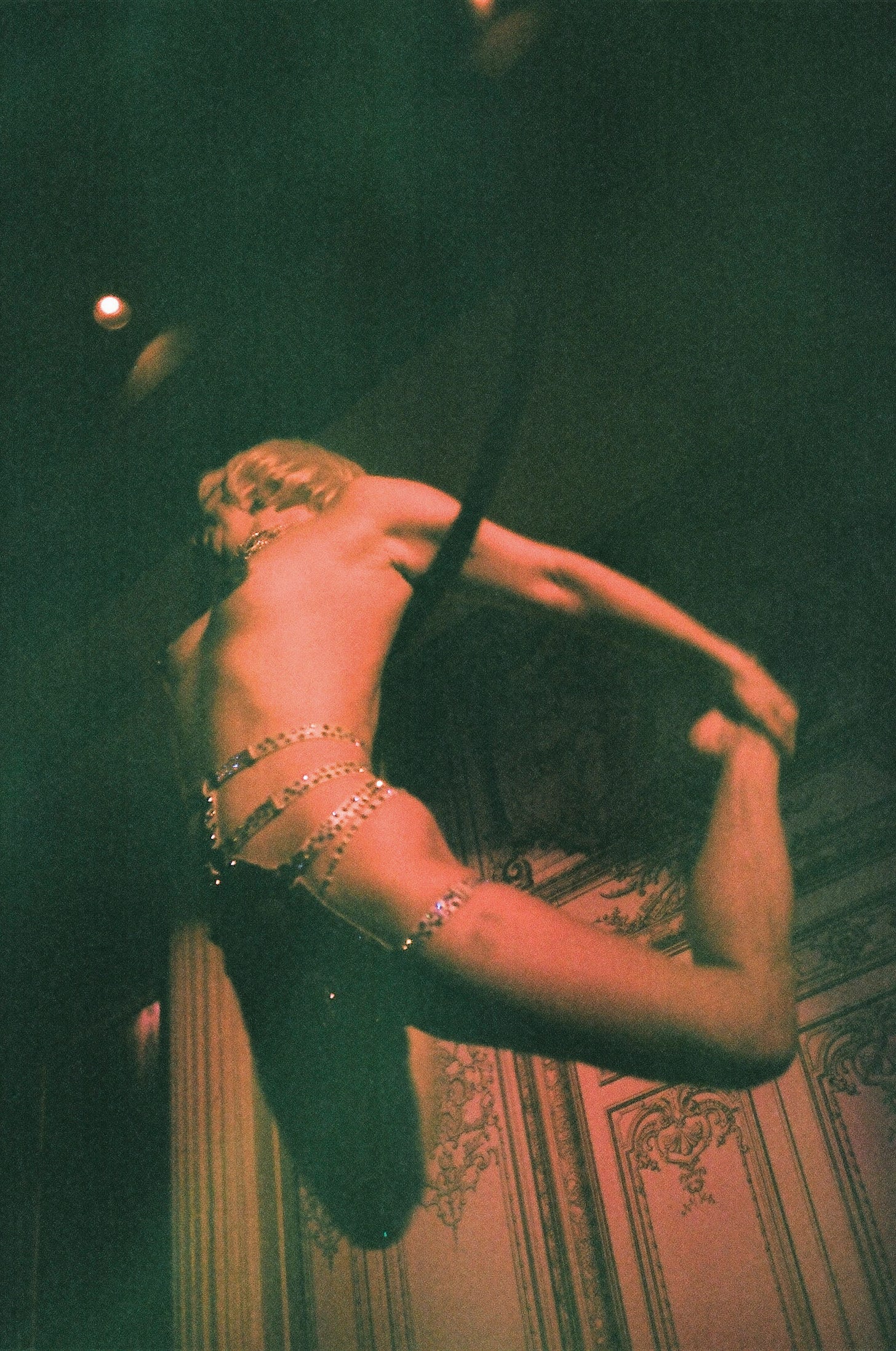Designer vaginas, anal botox, and hole rejuvination: The new frontier of intimate skincare
At The Hole Debate, writers, thinkers, and plastic surgeons discuss how the beauty industry is capitalizing on sexual insecurity—and what that means for us
“One of the greatest things about sex is that it’s a state of totality. We fuck to make the self go away,” says writer Patrick Nathan. To him, fucking is a sacramental behavior that—along with spirituality, art, and drugs—is un-self-conscious, un-individuated, and non-commercial. But the beauty industry is encroaching on this territory. This is the premise of The Hole Debate, a Substack event bringing together writers, thinkers, plastic surgeons, and anal specialists to discuss the new frontier of the beauty industry: our holes. With state-of-the-art treatments like vaginal rejuvination, labiaplasty, and butthole botox gaining traction—along with a deluge of new creams, serums, and other forms of intimate skincare—self-optimization is no longer limited to the face. This newfound commercialization of our nether regions begs the question: What does this mean for sex?
Curated by the brilliant Jessica DeFino, who writes The Review of Beauty, The Hole Debate took place last week at Duane Park, at a supper club known for live music and burlesque—which was how we kicked off the evening, with dancer Marcy Richardson belting an operatic number while simultaneously performing a titillating aerial act. Then, the first debate of the night: cosmetic gynecologist Dr. Michael Reed vs. sexual culture critic Magdalene Taylor, who publishes the newsletter Many Such Cases. The topic of discussion was whether labiaplasty—a procedure which involves trimming down the labia to produce a “neat and tidy” appearance, and is sometimes referred to as “designer vagina surgery”—is, or can be, empowering for women.
It’s a subject Taylor and I discussed over drinks at a bar the week before, landing on pretty much the same page: The beauty industry has leveraged the rhetoric of “empowerment” to reframe individual decisions as socially empowering, when they’re actually just personally beneficial. This not-so-subtly papers over the fact that the reason many of us find “empowerment” through cosmetic procedures is that we’ll otherwise be oppressed or shamed for how we look—and that in taking action (and spending money) to adhere to increasingly rigid beauty ideals, we reinforce the status quo that left us feeling inadequate in the first place. In her words:
“Your genitals are your own business, as is your sex life. But to classify it as empowering does have broader social consequences. Asserting that there is a specific type of labia that affords us rights and authority only limits the number of women to whom we perceive to have power—an explicit act of disempowerment.”


She also pointed out that labiaplasty has boomed over the last decade—and that according to research by the National Library of Medicine, appearance is the primary motivating factor, despite the fact that a majority of women who undergo the procedure have what is classified as “normal” labia.
Taylor’s opponent is quick to emphasize that not all women are the same, and that what’s empowering for one might be disempowering for another—but as she counters, there are no reports of women enlarging their labias, and 71 percent of women who undergo the procedure report having received critical comments from a sexual partner. This suggests that women are pursuing labiaplasties to adhere to rigid, socially-induced beauty standards (even if, as Dr. Reed notes, their sexual partners are often nonplussed by the decision.)
Here’s the tricky thing: When a woman makes a choice like this to alleviate the friction of her own insecurity, it can feel empowering, freeing up mental headspace that was previously dedicated to self-consciousness and can now, in theory, be dedicated to sexual pleasure. To this end, Dr. Reed is quick to employ the language of feminism to support the idea that labiaplasty can be beneficial for women. “Female empowerment is about the power to choose, freely and without judgment,” he argues. “True empowerment lies in bodily autonomy: The right for a woman to make informed decisions about her own body without influence or questioning of anyone, whether it be a man or a woman.”
“These choices are not made in a vacuum—and while these women may not be directly pressured by their partners, their desires are being influenced by bigger societal forces.”
The problem, of course, is that these choices are not made in a vacuum—and while these women may not be directly pressured by their partners, their desires are being influenced by bigger societal forces. In the era of social media, we’re now incentivized to justify our individual lifestyle choices, framing them as an extension of our core values, lest we face allegations of hypocrisy. This is part of why behaviors like dieting, or wearing makeup, have been rebranded not as a capitulation to patriarchy, but a form of “self-care.” No one wants to be a bad feminist—but the problem with labeling individual choices as “empowering” is that it shifts attention away from the very real pressures that shape what we desire and how we behave, curtailing meaningful discussion around the grey-area choices many of us make to survive and thrive within an unfair system.
I could talk about this forever, but I’ll save that for another piece and give you a taste of what came next: a fun, flirty, conversation about anal hygiene, around which a cottage industry of beauty products—including scrubs, serums, toilet-mounted mirrors, special soaps, and cosmetic surgeries—has cropped up. Attempting to parse necessary personal hygiene from the neurosis of self-improvement culture, Patrick Nathan engaged in a lively debate with renowned anal surgeon Dr. Evan Goldstein, who specializes in what is scientifically termed “butt stuff.” He brought up interesting points about the broader social context in which this industry has thrived—one in which our phones often shed light on the areas where the sun don’t shine, creating new awareness, and insecurity, about what our buttholes look like in hi-def.
“Because smartphones have become, in our society, a kind of prosthetic consciousness, they function as a sexual prosthetic,” Nathan states, noting that it’s through our phones that we find sex partners, compare ourselves to our peers, surveil our bodies, consume sexual content, and and cultivate our preferences. This reliance on technology is, according to him, how beauty standards have become so omnipresent that companies are racing to market products and procedures to optimize our assholes—even though many of them are “unvetted, untested, and in most cases emphatically not recommended.”
From the Brazilian wax to the vaginal douche—the next two topics of debate—many of the things we do to pursue the aesthetic of genital cleanliness are actually bad for our bodies, and create more problems than they solve. I’d argue that many of them derive not just from our current conditions, but from the deep well of shame that has long defined society’s relationship to sex. Many of us were subconsciously programmed to view sexual desires as dirty, unclean, and immoral. Is it any surprise that there’s a cottage industry seeking to capitalize on the compulsive urge to nullify these associations—whether through a Barbie-smooth pubic mound, or a ceaselessly douched, assuredly shit-free asshole?
“This kind of neurosis is precisely why beauty must be distinguished from hygiene,” says Nathan. “Beauty is a fantasy, often built on and fueled by ignorance or compartmentalization. Hygiene, on the other hand, is rooted in knowledge—in authority.” Maybe that’s why, instead of arguing a counterpoint, his opponent decided to empower the audience with information, listing off a series of facts about how best to care for your butthole. In the end, the two men agreed that they don’t really disagree—and Dr. Goldstein was pronounced the winner, though to be honest, I feel this was more about a crowd-pleasing delivery than the underlying argument (which, like Dr. Reed’s, hinges on the idea that the right product can alleviate the haunting insecurity that’s chipping away at people’s sexual agency.) The problem, as Nathan points out, is that the company that makes these serums don’t really care about that; rather, they’re leveraging our insecurities to manipulate and misinform, selling us on the idea of a body or lifestyle that will not actually deliver us the liberation we seek.
Many of us were subconsciously programmed to view sexual desires as dirty, unclean, and immoral. Is it any surprise that there’s a cottage industry seeking to capitalize on the compulsive urge to nullify these associations—whether through a barbie smooth pubic mound, or a ceaselessly douched, assuredly shit-free asshole?
At the heart of these debates lie questions about empowerment, autonomy, sex appeal, and how the way you feel about your body dictates your sexual experience. Particularly for women, self-consciousness during sex can translate to a behavior known as “spectatoring,” or imaging yourself from the perspective of an observer—and this translates to reduced feelings of bodily pleasure and sensation. So if a 12-step asshole skincare routine, or a vaginal beautification procedure, allows you to experience sex fully without being plagued by self-consciousness, then I completely understand why you would do that. The problem is that all this fuss really shouldn’t be necessary for us to feel okay about our bodies—and massive, multibillion dollar industries are profiting from the insecurities we hold about the most intimate aspects of our lives.
This idea is addressed head-on in a debate between Cindy Gallop, writer of Dear Cindy and CEO of Make Love Not Porn—a user-generated, human-curated platform dedicated to showcasing “real world sex”—and Emily Kirkpatrick, a writer specializing in fashion and pop culture who co-hosts a podcast with DeFino and publishes the newsletter I Heart Mess. “Studies show that women who are distracted by their own appearance during sex have lower satisfaction and fewer orgasms,” says DeFino in her introduction on the topic, noting that while pubic hair has gone in and out of fashion since the Roman Empire, 80 percent of people now shave, sugar, or wax their pubes into oblivion—often prioritizing appearance over sensation and vaginal health. “Does prioritizing the aesthetic necessarily de-prioritize the erotic?” she asks. “What insecurities and inhibitions have been instilled in us by the prevalence of the pube-free pussy—and are we having less sex and worse sex because of it?”
Cindy Gallop, a foxy older woman, opens with a crowd-pleasing anecdote about how the younger men she dates “casually and recreationally” responded to her first Brazilian wax—and how, after years of stripping her hair follicles, she’s come to miss the “fine, upstanding bush” she used to have. She’s not the only one: The bush is back, as Kirkpatrick herself reported for The Cut. But the night of the debate, she presents a different perspective: “Hi, I’m Emily, and I’ll be arguing in defense of ripping hair off your labia and asshole,” she says in her equally hilarious introduction, going on to note that—while a lot of things in this world that can and do ruin sex—someone’s style of pubic hair is the least of our worries. She argues that while it’s tempting to attribute the tyranny of the Brazilian wax to a modern, porn-driven phenomenon, it’s actually an ancient practice. In fact, the hair removal product Nair derives its name from a Hindu caste of women known for their custom of removing body hair, citing reports from ethnologist F. Fawcett in 1901. Here’s a snippet of her argument:
“While we’ve been waxing for eons, the popularity of the Brazilian style really took off in the ’90s and early aughts—a period of time we now reflect upon as famously horny. Out of these decades, we get Sex and the City, and celebrities with sex tapes becoming even more famous because of them. We get the sophomore pornography of Abercrombie & Fitch ads, a Playboy Playmate reality TV show, and Tom Ford releasing his iconic Gucci campaign featuring pubic hair shaved into the shape of the brand's logo. This is not the media of an undersexed society! So despite the vast majority of vaginas being bald at this time, to all appearances, people be fucking.”
As Kirkpatrick says, our taste in pubic hair is cyclical—“and after decades of bald vag supremacy, that pendulum is now swinging back towards full bush being what’s considered transgressive, and thus what we find to be sexy and scandalous.” Gallop—who is “pro-sex, pro-porn, and pro knowing the difference”—says that anecdotally, on Make Love Not Porn, clips of real-world woman having sex with a completely bald pussy are hard to come by (and according to studies, sexual partners don’t much care either way, as long as it’s clean.)
This leads into the next debate, in which beauty writer Sable Yong—who authored the new book Die Hot with a Vengeance, and publishes the newsletter Hard Feelings—is enlisted to answer the question on everybody’s lips: “Is vaginal care the modern douche?” Apparently, DeFino searched far and wide for a representative of vaginal cleaning products willing to engage in the debate—and though the sector pulls in about 50 billion dollars selling vaginal wipes, supplements, sprays, and deodorants, “not one company was willing to come up here and defend the existence of their product.” So instead, DeFino takes the stage and argues the case using comical slogans and statements from leading vaginal care brands.
She starts off strong on behalf of Summer’s Eve: “Do I really need a special product just for my vagina, you might ask? We’re prepared with an evasive answer that obscures the truth!” (The truth, of course, is that vaginas do best when they’re cleaned with only water—meaning that using no product is, in this case, actually better for the health and odor of your vagina than any of the deodorants, washes, soaps or serums they’re intent on selling you. Quite the marketing ploy!)
Apparently, in the first half of the 20th century, douching was marketed as both a contraception by the cleaning company Lysol (yes, the same one that sells you disinfecting wipes.) Even when the product proved dangerous and ineffective as a contraceptive, the company continued pushing the many women quite literally died using trying to rid their pussy of its natural odor—because until 1952, the company’s formula contained cresol, a phenol compound that could cause inflammation, burning, and death.
What are vaginas supposed to smell like, you might ask? Well, actually, you probably wouldn’t ask that, but someone on Reddit did—and the answer is coppery and metallic (like pennies), sweet and earthy (like molasses), or a musky, cedar-y scent (like pencil shavings.) “The overwhelming consensus is that people are totally cool and enjoy the smell of vaginas,” says Yong, pointing out that our vaginas should smell like what they are—not like roses or a fresh summer breeze. Though that hasn’t stopped companies like Lemme Purr, which was founded by Kourtney Kardashian, from advertising vaginal supplements to “turn your vagina into a sweet treat—because you are what you eat,” as DeFino relays with a laugh.
United by a common theme, these debates shed light on the many-headed hydra of capitalism and how now, even our most private areas are subject to increasing scrutiny and commodification. It’s a fitting topic for DeFino, who is known for investigating the shadow side of the beauty industry—leading her to be dubbed “the woman the beauty industry fears.” But as she’s quick to remind, “I’m not obsessed with your holes in a weird way! The beauty industry is, and I’m obsessed with the beauty industry’s obsession.”
The event culminated to roaring applause, and the party didn’t stop there. Tiding myself over on tiny canapés of polenta and pesto, I got pretty tipsy at the open bar—and at the end of the night, I made use of the Polaroid cameras stationed in each of the bathrooms, where attendees were encouraged to take and submit “anonymous hole pics.” Maybe it was a trick of the light, the grainy effect of the film, or an evening spent deconstructing societally-instilled beauty norms—but as I surveyed the results before slipping them into the anonymous ballot box, I thought, admiringly, that it looked just fine to me.






It’s truly incredible how completely the contemporary consumerist mode has infiltrated our proverbial and literal holes. It’s plainly obvious why those advocating for the antiseptic and anesthetized nature of our holes tend to be people trying to sell us something, and I wonder who exactly is having transcendent sex when they’re preoccupied with their holes smelling like something other than what they are. It’s truly a denial of the most primordial and natural and beautiful aspects of sex, an antithesis of that titillating story of Napoleon & Josephine, when he asked her in a letter please not to wash herself before he could get back to taste her essence. “I’ll be there in a week,” he pleaded.
These conversations remind me of a lot of generational conversations we have with our mothers and grandmothers. I’m afraid that in the same way our grandmothers told us to douche, and our mothers told us to wax, well tell our daughters to get surgery on their labias.
I sincerely hope that labiaplasties and anal bleaching is not what we pass down to the next generation of girls as a new “old wives tale” about what men want. In fact, I hope our daughters can be as free a man to not consider how to alter her body to be what they want. This topic makes me so angry. Amazing read though.